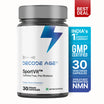Nicotinamide Mononucleotide (NMN), a precursor to NAD+, plays a critical role in cellular health, DNA repair, and energy metabolism. Known as the "elixir of youth" due to its potential anti-ageing effects, NMN is naturally found in various foods and can also be synthesized. As demand for NMN grows globally, its legal status in food and supplements varies across countries, creating challenges for manufacturers and consumers alike.
In this article, we explore the regulatory landscape of NMN in key regions worldwide.
China: Strict Regulations Prohibit NMN in Food
In China, NMN cannot be used as a food ingredient. The National Health Commission rejected NMN's classification as a new food additive in May 2023, citing stringent requirements for safety and nutrition.
Key pathways for NMN approval in China include:
- New Food Additive: Subject to strict processing-specific requirements.
- New Food Raw Material: Focused on nutrition and safety, making this the best option for NMN.
- Functional Nutrition Food Raw Material: Enables use in health-focused foods with proven safety and benefits.
For now, NMN remains off the table for food applications in China, with ongoing reviews expected to shape future regulatory changes.
United States: NMN Enforcement Temporarily Halted
Previously, nicotinamide mononucleotide (NMN) was approved as a New Dietary Ingredient (NDI), allowing its sale as a dietary supplement. However, in November 2023, the FDA revoked this status, citing NMN's classification as a substance under investigation as a pharmaceutical drug. Under the Dietary Supplement Health and Education Act (DSHEA), ingredients classified as drugs cannot also be sold as dietary supplements.
In November 2024, in the Federal court ruling, the FDA was ordered to temporarily pause its enforcement actions against NMN supplements. The court also required the FDA to address a citizen’s petition filed by the Natural Products Association (NPA), which advocated for NMN’s reinstatement as a dietary supplement ingredient.
Industry Response
This reversal and subsequent court ruling have sparked mixed reactions. While the temporary halt allows vendors some relief, many stakeholders remain critical of the FDA’s lack of transparency regarding NMN’s classification process. They emphasize the need for regulatory clarity to ensure consumer access and market stability for NMN products.
Japan: NMN Permitted for Food Use
Japan leads the way in allowing NMN in both health supplement foods and functional food products. The Ministry of Health, Labor and Welfare (MHLW) officially approved NMN under non-drug list classifying it as food ingredient in 2020. Notably, Japan imposes no specific dosage limits, provided products adhere to dietary supplement standards.
This leniency has made Japan a hub for NMN-based products, fostering innovation in anti-ageing and wellness industries.
Canada: Approved for use with Stringent regulations
The Health Canada, the regulatory agency has approved NMN as a Natural Health Product in Canada. NMN products are approved to be sold in Canada upon meeting the Health Canada’s strict regulation and approval policy.
Australia: Limited to Export-Only Use
In Australia, NMN is classified as a complementary medicine under the jurisdiction of the Therapeutic Goods Administration (TGA). While NMN products can meet approval standards for export, they cannot be sold domestically. Individuals who need to import NMN for their personal use can do so under the Personal Importation scheme.
European Union: NMN Classified as Unauthorized
Under the EU’s Novel Food Regulation, NMN is considered a new food requiring safety validation. In November 2022, the European Commission deemed NMN an unauthorized novel food, halting its use until further safety studies are conducted. In order to market NMN supplements, assessment of the substance by European Food Safety Authority (EFSA) is required.
Comparative Overview of NMN Regulations by Region
| Region | NMN Use in Food | Regulatory Body |
| China | Not permitted | National Health Commission |
| United States | Temporarily permitted (enforcement paused) | Food and Drug Administration (FDA) |
| Japan | Fully permitted | Ministry of Health, Labor, and Welfare |
| Canada | Approved as Natural Health Product | Health Canada |
| Australia | Export-only use allowed | Therapeutic Goods Administration (TGA) |
| European Union | Prohibited as a novel food | European Food Safety Authority (EFSA) |
The Global Outlook for NMN in Food
Despite regulatory challenges, NMN's popularity as a health and anti-ageing supplement continues to rise. Regions like Japan lead the way in allowing NMN for food applications, while temporary relief in the United States offers hope for vendors and consumers alike.
Harmonized global regulations could unlock NMN's full potential by enabling its broader integration into food products. As safety studies advance and consumer demand grows, NMN may emerge as a key ingredient in the global health and wellness market, driving innovation and accessibility.






















